Ten years and a few thousand crores of turnover later, Home Ministry found enough of loopholes to suspend the barter trade at the Line of Control (LoC) at the peak of general elections. Faheem Mir reports a disturbing silence from the Trade Facilitation Centre (TFC) Salamabad, the spot that till recently, was at the core of biggest ever Confidence Building Measure (CBM) on Kashmir
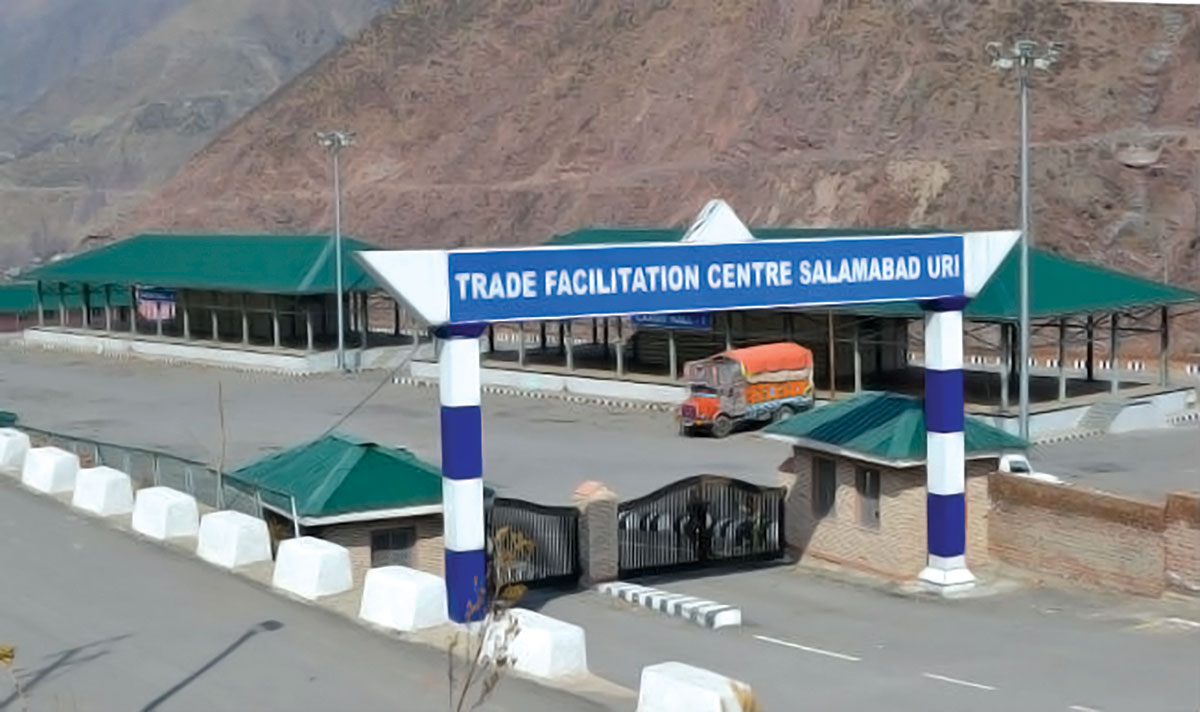
Samaj Nahi Aati Wafa Karin Tuo Kis Sey Karain Aakhir,
Mitti Sey Banay Loug Kagaz Kay Tukdoun Pe Bik Jate Heain
The lines painted on a seized Pakistani truck (P-9627) offer the crisis aptly that the cross-LoC barter is caught in. This truck was seized by the Jammu and Kashmir Police after it recovered 305 packets of brown sugar, each carrying 15 grams, on February 06, 2015.
The story of the truck and the trucker, in fact, lives the peculiar poetry that it carries. The truck owner literally sold his truck and its staff-gap driver Syed Anayat Hussain Shah for the sake of some pieces of paper, the money.
Shah was not P-9627 real driver, he told his interrogators later. On the eve of the truck’s departure to Salamabad from Chakothi (PaK), the actual driver fell ill. The truck owner requested Shah to drive the routine cargo to Uri. He said he did not know what the consignment was. Since the police in PaK, checked the cargo and allowed it to go, he told the police, he was not worried at all. During the mandatory checking of the cargo after unloading in Salamabad, the packets tumbled out and Shah was arrested. He is in jail and facing the trial under stringent anti-narcotics law. In the swift follow-up, the police arrested three Kashmiri traders Majeed Shalla, Zahoor Malla and Yusuf Dar.
But Shah’s is not the only case involving the abuse of the rare window that opened for travel and trade between the divided Kashmir. Earlier, there were two more Pakistani trucks that police seized. One of the bedecked trucks remains in Kalgie police post in Salamabad and the other two are in police station Uri, the last relics of barter that Government of India believes has gone wrong.
The barter has its peculiar SOP. Well before the cargo is loaded, the security apparatus of the respective country goes through every bit of it. Once the truck crosses over, the security apparatus of the other side takes over – the cargo is unloaded and every item is scanned. The two sides have a very limited number of items approved for barter and some additional items were added a few years later. Initially, the trade, started in November 2008, was permitted for a day, then it was doubled and the last time, it was transacted, it was for four days, a week.
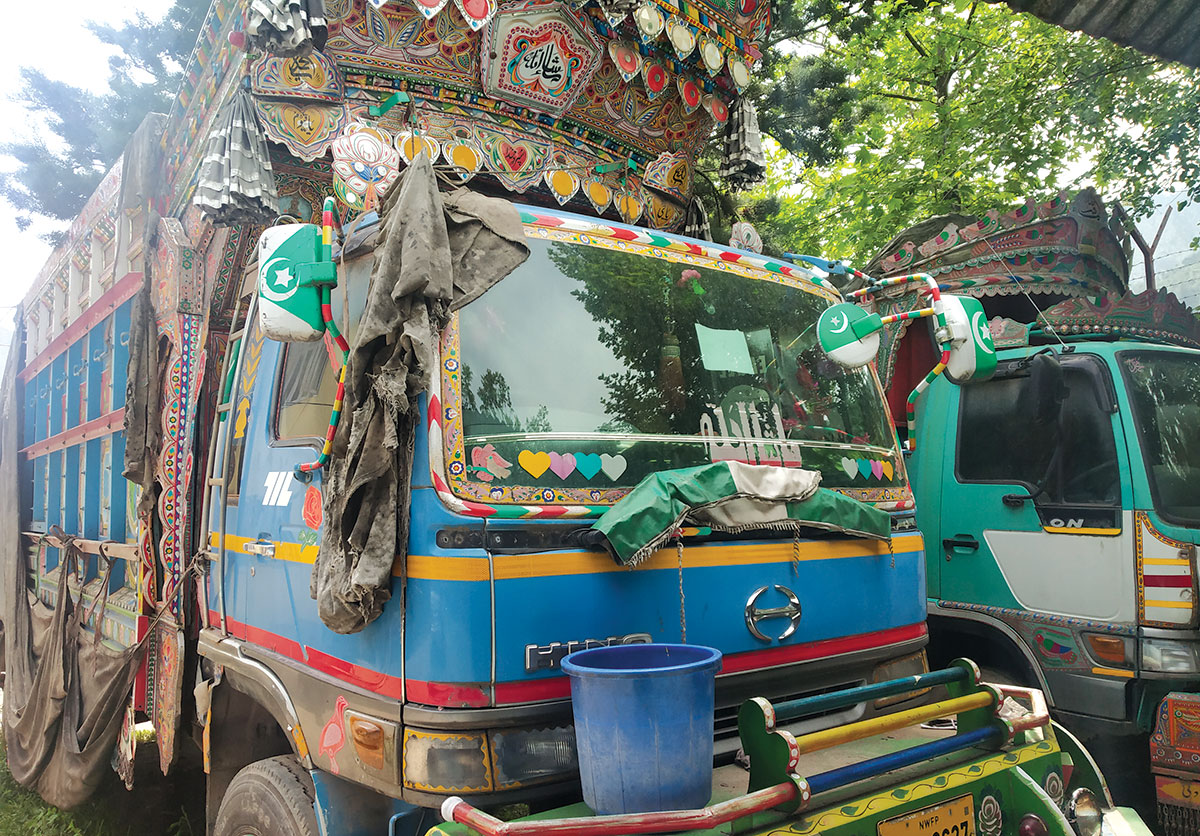
“I think the driver should not be blamed for it he handovers his truck to checking party and if the police give him clean chit how he can he be responsible, it is a security failure,” a police officer said. “The cases are sub-judice as the trials are going on.”
The initial police investigations suggest that some players wanted the smuggling material must get into Jammu and Kashmir. The drivers are regarded as mere workers who just work for their bosses. “The drivers even don’t know what is loaded in these trucks because they feel secure as their job is to drive the cargo and they do not care about the cargo,” the officer said. But the law does not recognize this all. Before the law, the criminal is the person from whom banned items are recovered. Rest is a matter of investigation.
There were some trucks and truckers from Kashmir who were seized for the same offence as well. The first incident of smuggling was reported on August 2, 2013, when police recovered 10 kg of cocaine after from the truck JK02F-0127 after it returned from PaK. Its driver Abdul Ahad, a resident of Mawar (Handwara) was arrested.
The barter trade started on October 21, 2008, as a confidence-building measure (CBM). It came three years after the Jhelum Valley Road (JVR) opened for relatives of the divided families in April 2005. Right from the start, the barter remained embroiled in a series of crises including procedural and physical infrastructure. The traders did not know their partners as they lacked a communication system. That was perhaps why the barter was termed to be “blind trade”. Though the Government of India permitted a trade delegation from the PaK, it, however, did not grant permission for a return delegation by the local traders. However, the internet eventually emerged as an alternative as the two partners started interacting through Facebook and WhatsApp.
Within a few months, the traders started reporting disputes and there was no resolution mechanism. In Poonch, from Chakan da Bagh, one trader who had a lot of capital arrears on the other side, one day became a driver and went across to meet his trading partner. As the government avoided an intervention, it gradually led the traders from the two sides to create their own mechanism. Once in a quarter, they would seek permission from the local authorities for a meeting on zero lands. These were interesting meetings in which the two sides would settle their dispute amicably on the de facto border.
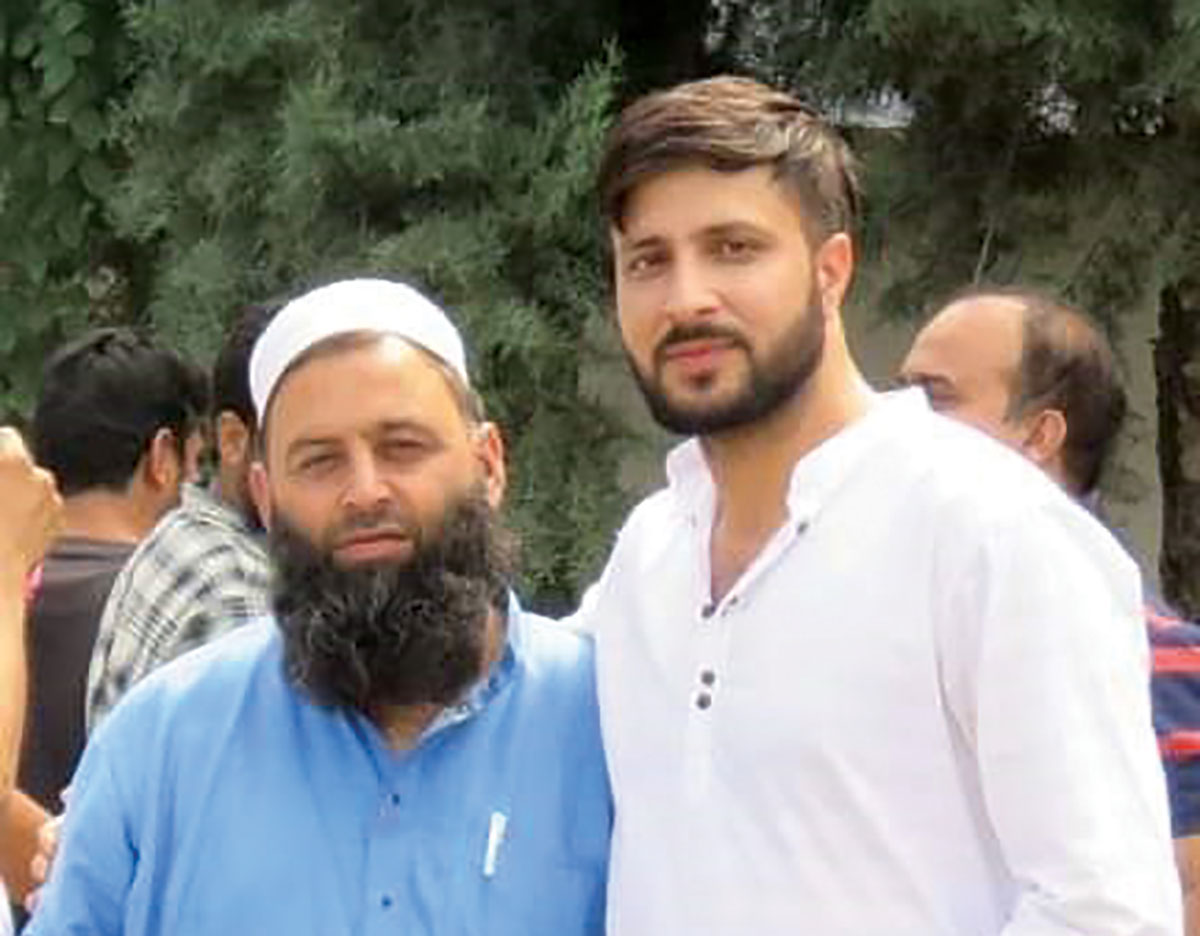
From day one, the barter faced currency issues. The only way-out was to trade in a third country currency but the local trade opposed to the idea saying it will upgrade the barter to international trade. The state government suggested a mechanism that required establishing banking relations but the idea was not accepted by either Delhi or Islamabad.
Unlike Wagha, the main trading point between India and Pakistan, the barter at Chakan Da Bagh and Salamabad is a duty-free trade. Delhi sees the other Kashmir being part of Jammu and Kashmir and the barter is literally taking place between the same state. Pakistan’s view is not much different, though from a different point of view. The LoC traders say that unlike LoC barter, if the security agencies detect anything illegal being transported from either side, it is being destroyed, there and then.
At one point in time, the barter bottlenecks created a situation that it became unattractive. At the peak of that slump, it emerged as cross-cousin trade between the divided families living on either side. Later, the security agencies started a new process and enlisted new traders through a long process involving verification of the individual antecedents by almost all the security agencies.
The two traders would also face a new tension every time the rival armies would hit each other. This phenomenon, however, created major problems to the traders on either side of the Chakan da Bagh. Whenever the tensions erupted between India and Pakistan the first casualty becomes the road which connects them.

The barter was facing another interesting problem. The zero-duty trade made imports and exporter cheaper, in comparison to the formal imports from Wagha. A section of traders in Lahore and Amritsar started using the LoC routes to exchange the items they wanted. They used some of the local LoC traders as their agents. A sizable chunk of the imported items would simply be diverted to Punjab because the quantum of items imported was disproportionate to the consumption requirements in Jammu and Kashmir. However, a lot of perishable items, mostly fruit and vegetables, were getting consumed locally. This was a bigger crisis that the barter was facing.
Despite all these problems, the barter completed a decade in November 2018. The quantum of trade has been quite impressive given the limitations of items permitted for exchange, the frequency of the trading days and the number of traders involved.
It was in this backdrop that the Home Ministry announced a suspension of the barter trade. “The Government of India has received reports that cross LoC trade routes in Jammu & Kashmir are being misused by Pakistan based elements. This misuse involves illegal inflows of weapons, narcotics and currency,” the MHA said in its communication banning the barter on April 18. Owing to the collapse of the Kaman bridge, no barter trade was taking place since February 14. “The LoC trade mechanism is, therefore, being suspended pending the putting into place of a stricter regulatory regime. This is to ensure that only bonafide trade takes place, for the benefit of the people of Jammu and Kashmir, through this mechanism.”
A few days later, the MHA detailed in a statement the reasons for halting the key CBM. It said the “third parties manipulated the trade and misused it for trading goods being produced from outside the State of Jammu and Kashmir” like Californian almonds.
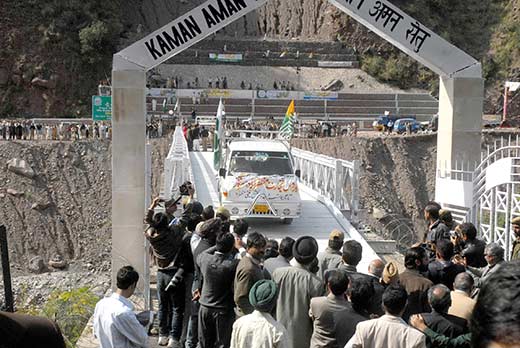
Citing the ongoing investigations in the hawala operations involving businessman Zahoor Watali, some of whose properties have already been attached by the NIA, the statement said the investigations have revealed the modus operandi. “Pakistani trader under invoices the product like California almonds to the extent of money received by him. On receipt of the consignment, a trader on the Indian side sells California almonds at the prevailing market price and makes an extra and undue profit to the extent of under-invoicing,” the statement said. “Extra money so generated is handed over by the trader to anti-national elements and terrorist organizations in the valley to fuel anti-India operations.”
The statement said the barter is being used “as a regular channel of funnelling of drugs such as cocaine, brown sugar and heroine” and in one recent 66.5 kg of heroine was seized. This, the statement said, was in addition to “periodically smuggling arms and ammunition”. Recently, it said, “a large cache was concealed in a consignment of bananas (and) was seized from a cross LoC driver from Kulgam.” Besides, the law enforcement agencies seized “Rs 57 lakh, Rs 20 Lakh, Rs 15 lakh and Rs 7.5 lakh of fake currency notes” in which “over a dozen of people have been arrested.”
“The Government will revisit the issue of resuming the LoC trade after stricter measures and systems are put in place to address these issues,” the statement said. “New measures are expected to restore the benefit of LoC trade to local population only, rather than allowing terrorist organizations and unscrupulous traders based far away from these trading points to syphon off the benefits and fuel instability in the valley.”
A few days later, a list of Muzaffarabad based “militants” was in circulation on the social media suggesting they were actually the trading partners from the other side. The list carried no sources from where it emanated.
The ban has rendered the Pakistani trucks like deserted Dulhans in the police station Uri. A line written on one of these seized trucks sums up this all – Ghaaye Gi Duniyan Geet meray.
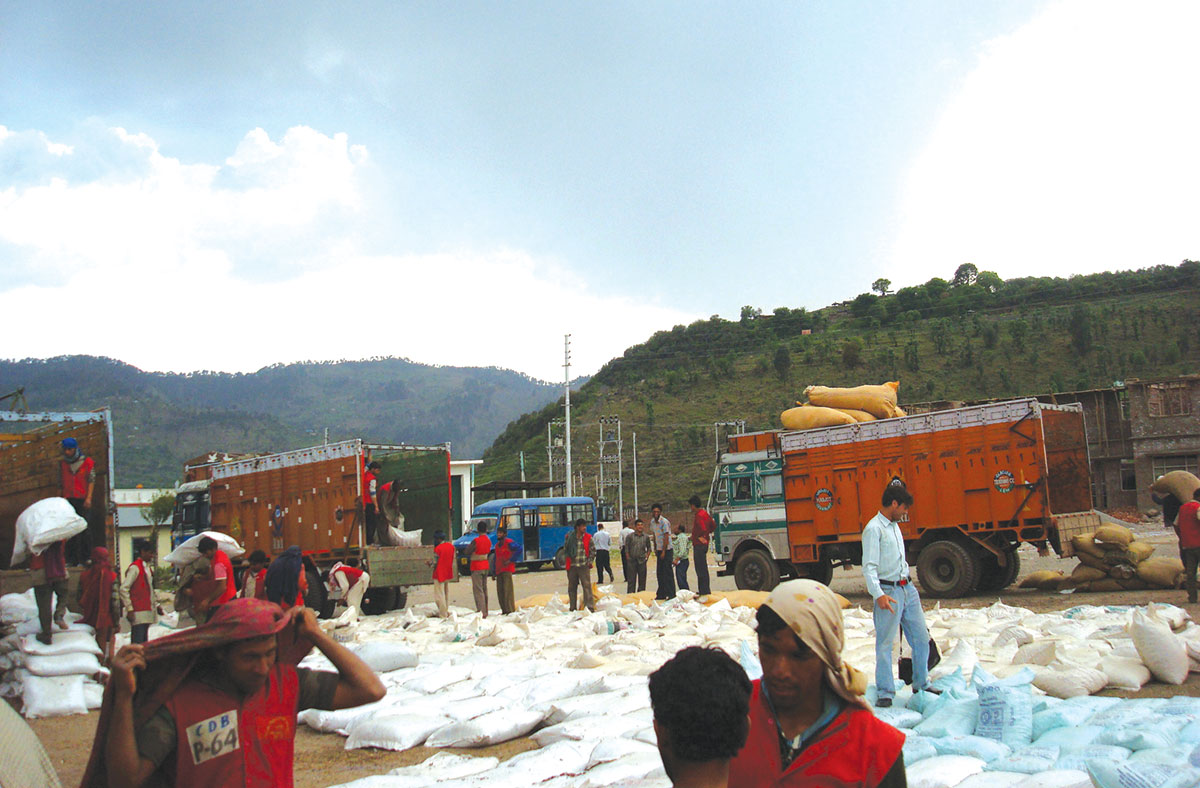
People did sing the songs in praise of the barter trade when it started. But, right now, it is pain for a lot of people who were involved with the exercise. For the last two months now, as the barter stopped, people related to it are facing harsh times. There are 229 traders engaged in trade but the exercise involves a few thousand people.
“I used to work in Srinagar before the trade started and I was earning Rs 2000 a month,” Abdul Jabbar, one of the shopkeepers outside the TFC, said. “After the TFC was established, I, sometimes have Rs 20000 turnover a day”. But that was till the TFC operated.
The shops parallel to the TFC are shut for two months. “I have paid advance rent for this shop to establish a tea-stall,” Mushtaq Ahmad, who runs the shop, said. “But a month’s operation and the trade was closed. I have nothing to survive on.”
Kabeel Hussain is another shop-keeper. “I am facing 70 per cent of the decline in sale since the day trade stopped,” he said. “There are hundreds of labourers who were working at the TFC. A trader may bear the loss but labourers were just earning their daily-wages.”
The families of these labourers were solely dependent on this trade. “My father is in hospital from past many days and I don’t have work from past two months now, how can I afford his medical expenditures,” asked Nazir Ahmad, a TFC labourer.
There are around 30 trucks loaded with dry fruits, carpets and textiles stuck at Salamabad Trade Facilitation Centre (TFC). These trucks are there for two months.
“I have to pay Rs 12000 per day per truck and it is around Rs 6 lakhs,” Toshi Zaffar said.
A resident of Uri, Toshi is a registered LoC trader since 2012. “People have stores and they had kept their items there. I loaded directly on trucks and parked them in the TFC and now I have to pay Rs 1000 per truck for every 24 hours and I have 12 truckloads there,” Toshi said. “The trucks were waiting for their turn and then the bridge collapsed and while we were waiting for the repairs, the trade was closed. It is devastating.”
Traders wish to have a complete and proper scan of trucks on either side to ensure the smooth trans-border trade. “We request our government and security agencies to ensure a smooth process of trade,” Tanveer Ahmad said.
The only people who are seemingly enjoying the stay are the cops. “These are lazy days now,” one cop said. “We do not have any work.”
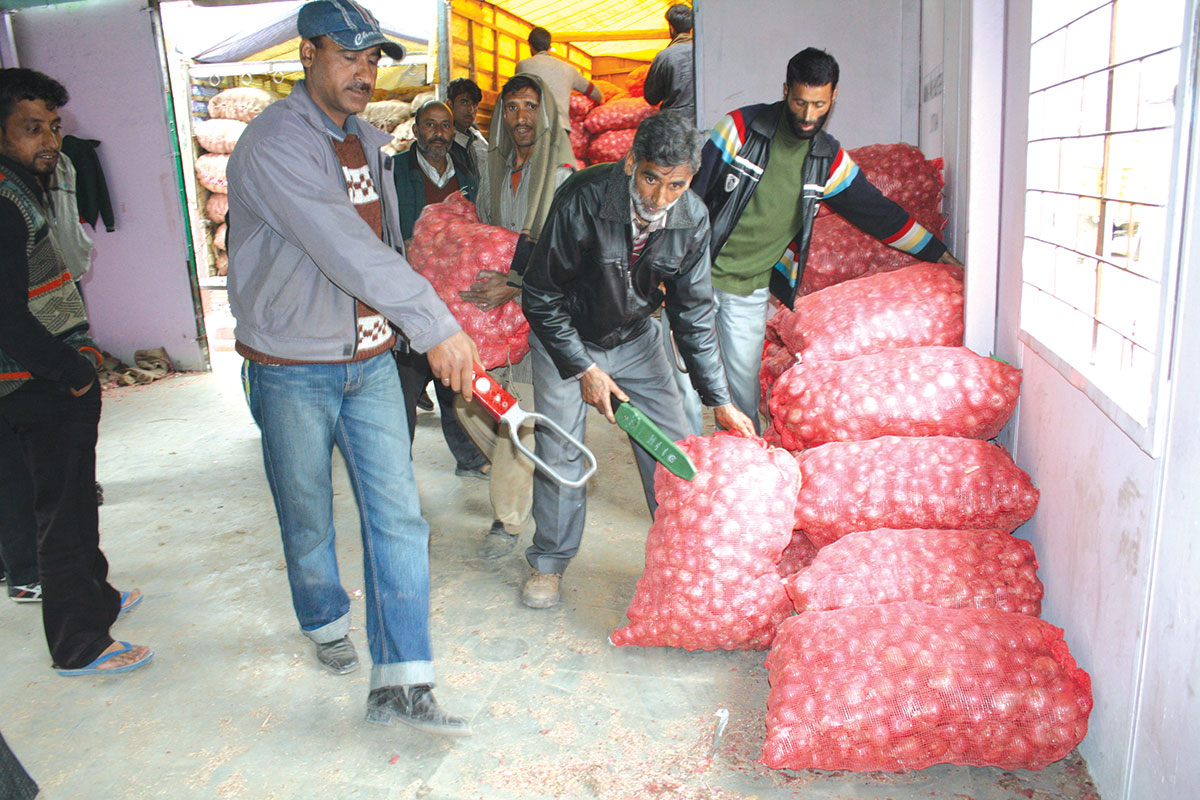
For managing 30 to 50 trucks, four times a week is not an easy job. “We have to get in every truck at Kaman Bridge and escort them to the TFC and then take care of the driver,” one cop said. “Once the truck unloads the cargo, he was to be escorted to the bridge.” No driver was permitted to even move out of the TFC. If they wanted to meet somebody – a trader or a driver, it had to be in the open. It was a different section of the police that would scan the cargo, piece by piece.
The traders also alleged that sections within the system and the media were against the trade from day one. “Last year, few cameramen came and reported that the TFC mosque was furnished by Pakistan,” Iqbal Khursheed a local transporter said. “This gave a wrong impression but it did not tell the people that carpet is one of the 21 items allowed for trade and one trader contributed this piece to the mosque.”
Since the MHA has indicated that the barter will be revived after a fool-proof mechanism will be put in place, the traders demand a proper checking system. “The load which comes from PaK is not ours till the government hands it over to us after complete satisfaction,” Tanveer, one of the traders, said. “It is the government that exchanges goods; we are just mediums and instruments. If sometimes the untoward happens, the TFC authorities must blame their counterparts, not on a driver or us.”
TFC traders, General Sectary Haji Mohammad Shafi blamed Pakistani security agencies for abusing the “loopholes” and wants a stringent system of checking the cargo before it crosses in Jammu and Kashmir. However, he insisted that all the “bad incidents” had taken place four years back. “Things were quite normal now.”
Traders insist that the security grid on both sides must take the blame for the incidents. “There could be some black sheep but it is security agency’s job to ensure the smooth process of trade,” Haji said.
The government of Jammu and Kashmir had been seeking installation of a whole body scanner to be installed at the two windows in Slamabad and Chakan da Bagh. The proposal was finally approved and was part of a vast set of infrastructure that was to be developed at the two trading and travel points.
The work on the scanner started but is yet to be completed. “I completed all the formalities to apply for the tender but it was a Hyderabad based company that bagged the job,” contactor Shahid Raina said. “After few months they called me and asked to start the work. I sought approval but they did not give it so I did not proceed ahead.”
Cross LoC trade and travel have been the only two CBMs of any consequence on Kashmir between India and Pakistan. Though the expectation was that the engagement will get to the next level, the situation changed abruptly.
Haseeb Drabu, state’s former finance minister, who has remained part of the process does not see it as a good omen. The barter, he recently wrote, was part of a larger change in the strategy for dealing with Kashmir at the policy level. “It is no longer about doves and hawks. It is now about bulls and bears,” he wrote. “If anything, the timing and method suggest a hidden agenda. It is linked to the issue of Article 35A. For this trade was meant only for locally-produced goods to be traded by local traders; in other words, “state subjects”, a category that the present dispensation wants to get rid of.”
Modi intervention was undoing of Vajpayee in Kashmir. “Cross LoC trade was a legacy of the Vajpayee Govt decision to facilitate greater people to people contact across the Line of Control in J&K,” Omar Abdullah reacted. “That the LoC trade may have been used by some traders for illegal activities was suspected for years now and it was to plug this that the state has been pleading for the installation of full truck scanners at the trade points.”
“Extremely unfortunate that GOI instead of enhancing people to people contact as families of both side of LOC stand divided & improving trade & other ties, even whatever little had been achieved since Vajpayee time is being blocked & stopped,” Mirwaiz Umer Farooq reacted. “Such measures for short term gains come at a huge price for people.”
“Using Kashmir as a scapegoat to claw its way back to power won’t help BJP,” Mehbooba Mufti said. “It’s an excuse to worsen ties with Pak despite their peace overtures. By doing this PM Modi has dismantled a CBM Initiated by Vajpayee Ji.”
Omar and Mehbooba led separate symbolic protests against the move. Mehbooba, later, said Delhi wanted to do it when she was the Chief Minister but she put her foot down.
“When the trade and travel started, we were in fact seriously thinking of permitting school excursion,” Mohammad Salim Beig, the then Director General Tourism said. “They might have stopped it for the time being but the real pull of the people will force them to make it resume as early as possible.” He said this has been a Himalayan intervention in the cold relationship between the two sides.
Beig may be vindicated anytime in future but right now, Salamabad – Chakothi stretch of the JVR is silent and scary. It used to be so silent only when the gunners were at work.















